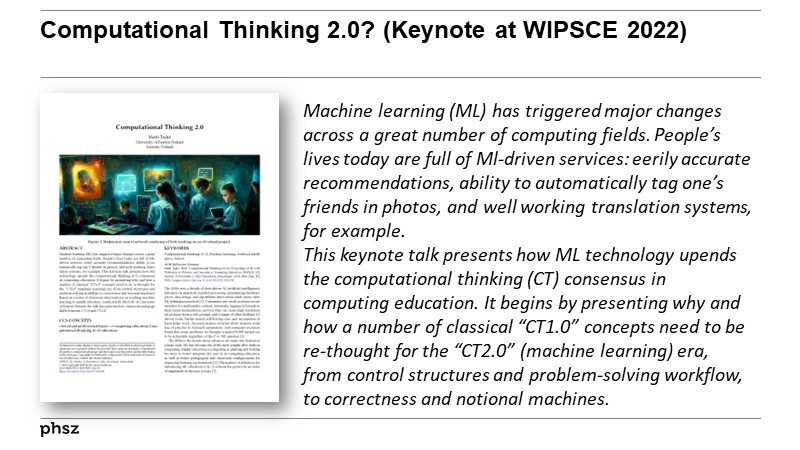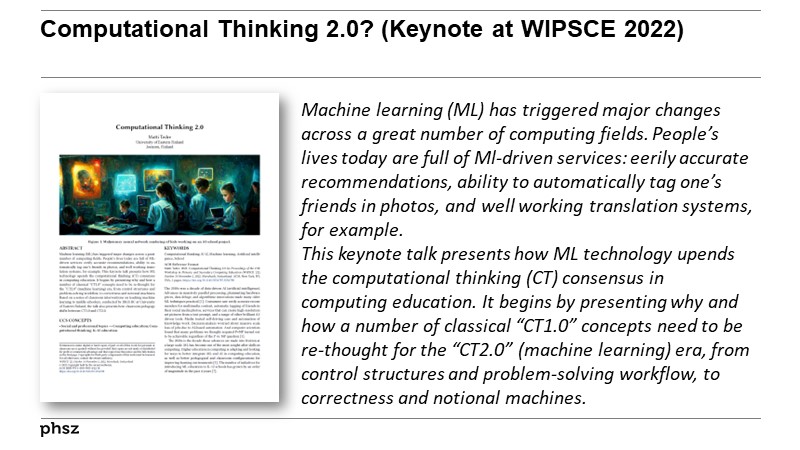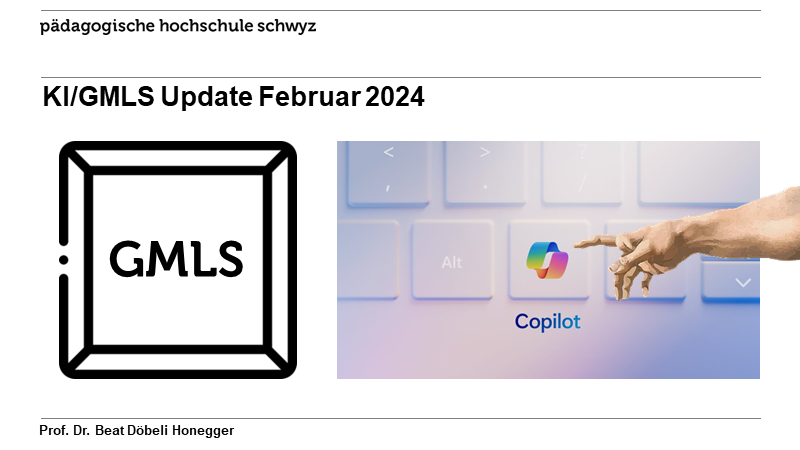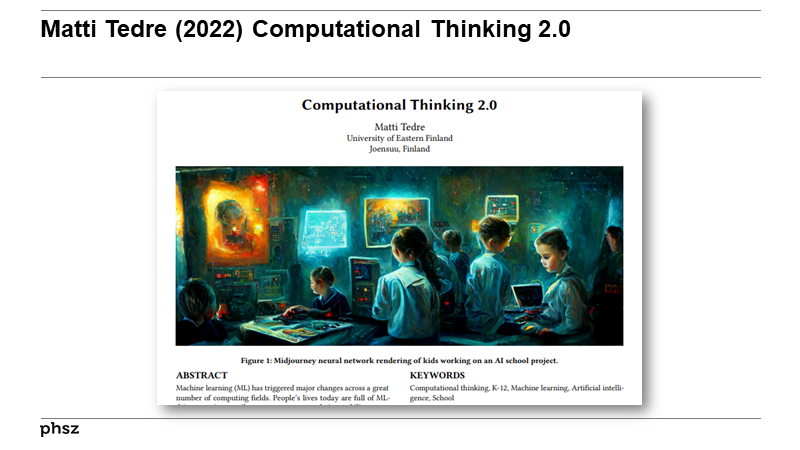Matti TedreDies ist keine offizielle Homepage von Matti Tedre, E-Mails an Matti Tedre sind hier nicht möglich! |
 2 Bücher von Matti Tedre
2 Bücher von Matti Tedre 
 17 Texte von Matti Tedre
17 Texte von Matti Tedre 
| Jahr | Volltext | Abrufe | Text | Texttyp |
|---|---|---|---|---|
| 2006 |   |
The development of computer science - a sociocultural perspective (Matti Tedre) erschienen in Koli Calling 2006 | Konferenz-Paper | |
| 2008 |   |
Three traditions of computing - what educators should know (Matti Tedre, Erkki Sutinen) erschienen in Computer Science Education 3/2008 (Seite 153 - 170) | Journal-Artikel | |
| 2009 | Undergraduate research in CS - a global perspective (Lawrence D'Antonio, Roger D. Boyle, Amruth N. Kumar, Logan Muller, Claudia Roda, Matti Tedre) erschienen in ITiCSE 2009 (Seite 139 - 140) | Konferenz-Paper | ||
| 2012 |   |
New perspectives on the pedagogy of programming in a developing country context (Mikko Apiola, Matti Tedre) erschienen in Computer Science Education 3/2012 (Seite 285 - 313) | Journal-Artikel | |
| 2013 |   |
Pedagogy of 1 - 1 computing in Colombia: a case study of three rural schools (David Silva, Matti Tedre, Mikko Apiola) erschienen in Koli Calling 2013 | Konferenz-Paper | |
| 2013 |   |
Methodology education in computing - towards a congruent design approach (Matti Tedre) erschienen in SIGCSE 2013 (Seite 159 - 164) | Konferenz-Paper | |
| 2013 |   |
Social media in everyday learning - how Facebook supports informal learning among young adults in South Africa (Tina Klomsri, Linn Grebäck, Matti Tedre) erschienen in Koli Calling 2013 | Konferenz-Paper | |
| 2013 |   |
An easy approach to epistemology and ontology in computing theses (Matti Tedre, John Pajunen) erschienen in Koli Calling 2013 | Konferenz-Paper | |
| 2017 |   |
1, 1, 8, 2, 5, 5, 5, 1, 4, 9, 6, 9 | Misconceptions About Computer Science (Peter Denning, Matti Tedre, Pat Yongpradit) erschienen in Communications of the ACM, Vol. 60 No. 3, Pages 31-33 | Journal-Artikel |
| 2018 |  |
1, 1, 11, 7, 3, 4, 6, 15, 9, 17, 9, 6 | The Nature of Computing as a Discipline (Matti Tedre) erschienen in Computer Science Education   | Kapitel |
| 2019 |   |
6, 1, 5, 4, 2, 2, 2, 4, 3, 4, 1, 10 | L’intelligence artificielle dans la formation (Pierre Dillenbourg) erschienen in Koli Calling 2016 (Seite 120 - 129) | Text |
| 2021 |   |
10 | CT 2.0 (Matti Tedre, Peter J. Denning, Tapani Toivonen) erschienen in Koli Calling '21: Proceedings of the 21st Koli Calling International Conference on Computing Education Research, November 2021 | Konferenz-Paper |
| 2021 |  |
2, 1, 4, 3, 2, 4, 5, 4, 2, 8, 4, 6 | Computational Thinking - A Professional and Historical Perspective (Matti Tedre, Peter Denning) erschienen in Computational Thinking in Education  | Kapitel |
| 2021 |   |
1, 2, 7, 3, 5, 4, 5, 3, 3, 11, 3, 6 | Computational Thinking for Professionals (Peter Denning, Matti Tedre) erschienen in Communications of the ACM, December 2021, Vol. 64 No. 12, Pages 30-33 | Journal-Artikel |
| 2022 |   |
3, 1, 6, 5, 9, 6, 5, 3, 7, 9, 14, 3 | Computational Thinking 2.0 (Matti Tedre) erschienen in WiPSCE '22  | Konferenz-Paper |
| 2023 |   |
4 | A Scientometric Perspective on the Evolution of the SIGCSE Technical Symposium: 1970–2021 (Sonsoles López-Pernas, Mikko Apiola, Mohammed Saqr, Arnold Pears, Matti Tedre) erschienen in Past, Present and Future of Computing Education Research (Seite 193 - 212)   | Kapitel |
| 2024 |   |
Enhancing Understanding of Data Traces and Profiling Among K-9 Students Through an Interactive Classroom Game (Juho Kahila, Henriikka Vartiainen, Eetu Arkko, Anssi Lin, Nicolas Pope, Matti Tedre) erschienen in WIPSCE '24   | Konferenz-Paper |
 Definitionen von Matti Tedre
Definitionen von Matti Tedre
| computational thinking |
|
 Bemerkungen von Matti Tedre
Bemerkungen von Matti Tedre
Von Matti Tedre gibt es im Biblionetz Bemerkungen zu:
 Zeitleiste
Zeitleiste
 CoautorInnen
CoautorInnen
Mikko Apiola, Eetu Arkko, Roger D. Boyle, Lawrence D'Antonio, Peter Denning, Pierre Dillenbourg, Linn Grebäck, Juho Kahila, Tina Klomsri, Amruth N. Kumar, Anssi Lin, Sonsoles López-Pernas, Logan Muller, John Pajunen, Arnold Pears, Nicolas Pope, Claudia Roda, Mohammed Saqr, David Silva, Erkki Sutinen, Tapani Toivonen, Henriikka Vartiainen, Pat Yongpradit,
 Zitationsnetz
Zitationsnetz 
 Begriffswolke von Matti Tedre
Begriffswolke von Matti Tedre
 3 Vorträge von Beat mit Bezug
3 Vorträge von Beat mit Bezug
- ChatGPT und die (informatische (Schul-))Bildung
Ausschuss "Bildung, Fachkräfte und Diversität" von digitalswitzerland, 07.03.2023

- Schule, Digitalisierung und die Rolle der Informatik
Landesinformatiktag Hamburg und Schleswig-Holstein, 25.03.2023

- Antworten auf Knopfdruck?
Mitarbeitendenklausur der PHSZ, 19.02.2024

 Zitationsgraph
Zitationsgraph
 Zitationsgraph (Beta-Test mit vis.js)
Zitationsgraph (Beta-Test mit vis.js)
 34 Erwähnungen
34 Erwähnungen 
- Visual Program Simulation in Introductory Programming Education (Juha Sorva) (2012)


- Coding Literacy - How Computer Programming Is Changing Writing (Annette Vee) (2017)

- Misconceptions About Computer Science (Peter Denning, Matti Tedre, Pat Yongpradit) (2017)


- ICER 2017 - Proceedings of the 2017 ACM Conference on International Computing Education Research, ICER 2017, Tacoma, WA, USA, August 18-20, 2017 (Josh Tenenberg, Donald Chinn, Judy Sheard, Lauri Malmi) (2017)
- Conceptions and Misconceptions about Computational Thinking among Italian Primary School Teachers (Isabella Corradini, Michael Lodi, Enrico Nardelli) (2017)


- Conceptions and Misconceptions about Computational Thinking among Italian Primary School Teachers (Isabella Corradini, Michael Lodi, Enrico Nardelli) (2017)
- Computer Science Education - Perspectives on Teaching and Learning in School (Sue Sentance, Erik Barendsen, Carsten Schulte) (2018)


- Informatics in Schools: Fundamentals of Computer Science and Software Engineering (Sergei Pozdniakov, Valentina Dagienė) (2018)


- Students Teach a Computer How to Play a Game (Sylvia da Rosa Zipitría, Andrés Aguirre Dorelo)


- Students Teach a Computer How to Play a Game (Sylvia da Rosa Zipitría, Andrés Aguirre Dorelo)
- Do We Really Need Computational Thinking? (Enrico Nardelli) (2019)


- Proceedings of the 14th Workshop in Primary and Secondary Computing Education, WiPSCE 2019, Glasgow, Scotland, UK, October 23-25, 2019 (2019)
- Development of a Questionnaire on Self-concept, Motivational Beliefs, and Attitude Towards Programming (Luzia Leifheit, Katerina Tsarava, Korbinian Moeller, Klaus Ostermann, Jessika Golle, Ulrich Trautwein, Manuel Ninaus) (2019)


- Development of a Questionnaire on Self-concept, Motivational Beliefs, and Attitude Towards Programming (Luzia Leifheit, Katerina Tsarava, Korbinian Moeller, Klaus Ostermann, Jessika Golle, Ulrich Trautwein, Manuel Ninaus) (2019)
- Informatics in Schools. New Ideas in School Informatics (Sergei Pozdniakov, Valentina Dagienė) (2019)


- Holistic STEAM Education Through Computational Thinking - A Perspective on Training Future Teachers (Arnold Pears, Erik Barendsen, Valentina Dagienė, Vladimiras Dolgopolovas, Eglė Jasutė)


- Holistic STEAM Education Through Computational Thinking - A Perspective on Training Future Teachers (Arnold Pears, Erik Barendsen, Valentina Dagienė, Vladimiras Dolgopolovas, Eglė Jasutė)
- WiPSCE '20 - Workshop in Primary and Secondary Computing Education, Virtual Event, Germany, October 28-30, 2020 (Torsten Brinda, Michal Armoni) (2020)
- Exploring the K-12 computer science curriculum standards in the U.S (Meize Guo, Anne T. Ottenbreit-Leftwich) (2020)


- Exploring the K-12 computer science curriculum standards in the U.S (Meize Guo, Anne T. Ottenbreit-Leftwich) (2020)
- Computational Thinking in Education - A Pedagogical Perspective (Aman Yadav, Ulf Dalvad Berthelsen) (2021)

- 1. Computational Thinking - A Professional and Historical Perspective (Matti Tedre, Peter Denning)

- 3. A Computational Thinking Integration Model for Primary and Secondary Classrooms (Steven Azeka, Aman Yadav)
- 4. Democracy and Computation - A Normative Perspective on the Magic of the New Millennium (Ulf Dalvad Berthelsen, Carsten Fogh Nielsen)
- 5. Computational Thinking as Subject Matter - As an Independent Subject or Integrated across Subjects? (Morten Tannert, Rasmus Fink Lorentzen, Ulf Dalvad Berthelsen)
- 7. Ethnocomputing and Computational Thinking (Michael Lachney, Briana Green, Madison C. Allen, Lakisha Foy)
- 1. Computational Thinking - A Professional and Historical Perspective (Matti Tedre, Peter Denning)
- WiPSCE '22 - The 17th Workshop in Primary and Secondary Computing Education, Morschach, Switzerland, 31 October 2022 - 2 November 2022 (Mareen Grillenberger, Marc Berges) (2022)

- Addressing challenges of constructionist modeling of adaptive systems (Uwe Lorenz, Ralf Romeike) (2022)


- 1. Computational Thinking 2.0 (Matti Tedre) (2022)


- Addressing challenges of constructionist modeling of adaptive systems (Uwe Lorenz, Ralf Romeike) (2022)
- Programmieren in der Grundschule - Eine Design-Based-Research-Studie (Katharina Geldreich) (2023)


- Past, Present and Future of Computing Education Research (Mikko Apiola, Sonsoles López-Pernas, Mohammed Saqr) (2023)


- Theory and Approaches to Computing Education Research (Arnold Pears, Mats Daniels, Anders Berglund)


- The Evolution of Computing Education Research: A Meta-Analytic Perspective (Lauri Malmi, Jane Sinclair, Judy Sheard, Simon, Päivi Kinnunen)


- The Venues that Shaped Computing Education Research - Dissemination Under the Lens


- The Evolving Themes of Computing Education Research - Trends, Topic Models, and Emerging Research (Mikko Apiola, Mohammed Saqr, Sonsoles López-Pernas)


- Theory and Approaches to Computing Education Research (Arnold Pears, Mats Daniels, Anders Berglund)
- HDI 2023 - Hochschuldidaktik Informatik (Jörg Desel, Simone Opel) (2023)


- Informatics in Schools. Beyond Bits and Bytes: Nurturing Informatics Intelligence in Education - 16th International Conference on Informatics in Schools: Situation, Evolution, and Perspectives, ISSEP 2023, Lausanne, Switzerland, October 23–25, 2023 (Jean-Philippe Pellet, Gabriel Parriaux) (2023)


- What Is AI-PACK? - Outline of AI Competencies for Teaching with DPACK (Uwe Lorenz, Ralf Romeike)


- What Is AI-PACK? - Outline of AI Competencies for Teaching with DPACK (Uwe Lorenz, Ralf Romeike)
- DELFI 2024 (Sandra Schulz, Natalie Kiesler) (2024)


- Web-based prototype of a visual and interactive deep learning simulation (Christian Koch, Frederic Salmen, Ulrik Schroeder) (2024)


- Web-based prototype of a visual and interactive deep learning simulation (Christian Koch, Frederic Salmen, Ulrik Schroeder) (2024)
- WIPSCE '24 (Tilman Michaeli, Sue Sentance, Nadine Bergner) (2024)


- Unpacking Approaches to Learning and Teaching Machine Learning in K-12 Education - Transparency, Ethics, and Design Activities (Luis Morales-Navarro, Yasmin B. Kafai) (2024)


- Unpacking Approaches to Learning and Teaching Machine Learning in K-12 Education - Transparency, Ethics, and Design Activities (Luis Morales-Navarro, Yasmin B. Kafai) (2024)
- Was alle über Künstliche Intelligenz wissen sollen und wie KI-bezogene Kompetenzen in der Schule entwickelt werden können - Weiterführende Überlegungen zum GI-Positionspapier „Künstliche Intelligenz in der Bildung“ (Daniel Losch, Steffen Jaschke, Tilman Michaeli, Simone Opel, Ute Schmid, Stefan Seegerer, Peer Stechert) (2025)


- Handbuch Lernen mit digitalen Medien (3. Auflage) - Wege der Transformation (Gerold Brägger, Hans-Günter Rolff) (2025)

- 1. Generative Machine-Learning-Systeme - Die nächste Herausforderung des digitalen Leitmedienwechsels (Beat Döbeli Honegger) (2025)

- 1. Generative Machine-Learning-Systeme - Die nächste Herausforderung des digitalen Leitmedienwechsels (Beat Döbeli Honegger) (2025)
- Digitalisierung in der Bildung - ein Kinderspiel? (2025)


 Volltexte
Volltexte
 |  Methodology education in computing: Fulltext at the ACM Digital Library ( Methodology education in computing: Fulltext at the ACM Digital Library ( : :  , 700 kByte; , 700 kByte;  : :  2020-11-28) 2020-11-28) |
 | Computational Machines: Kapitel als Volltext ( : :  , 119 kByte) , 119 kByte) |
 | Computational Thinking: Artikel als Volltext ( : :  , 135 kByte) , 135 kByte) |
 | Computational Thinking: Gesamtes Buch als Volltext ( : :  , 1078 kByte) , 1078 kByte) |
 | Teaching Computational Thinking for all: Artikel als Volltext ( : :  , 201 kByte) , 201 kByte) |
 | The Nature of Computing as a Discipline: Artikel als Volltext ( : :  , 353 kByte) , 353 kByte) |
 | The Science of Computing: Gesamtes Buch als Volltext ( : :  , 5415 kByte) , 5415 kByte) |
 |  Misconceptions About Computer Science: Artikel als Volltext ( Misconceptions About Computer Science: Artikel als Volltext ( : :  , 1493 kByte; , 1493 kByte;  : :  2020-11-28) 2020-11-28) |
 |  Three traditions of computing: Artikel als Volltext ( Three traditions of computing: Artikel als Volltext ( : :  , 232 kByte; , 232 kByte;  : :  2021-03-21) 2021-03-21) |
 |  New perspectives on the pedagogy of programming in a developing country context: Artikel als Volltext ( New perspectives on the pedagogy of programming in a developing country context: Artikel als Volltext ( : :  , 214 kByte; , 214 kByte;  : :  2020-11-28) 2020-11-28) |
 |  Computational Thinking for Professionals: Artikel als Volltext ( Computational Thinking for Professionals: Artikel als Volltext ( : :  , 2222 kByte; , 2222 kByte;  : :  ) ) |
 |  CT 2.0: Artikel als Volltext ( CT 2.0: Artikel als Volltext ( : :  , 1075 kByte; , 1075 kByte;  : :  ) ) |
 |  The development of computer science: Fulltext at the ACM Digital Library ( The development of computer science: Fulltext at the ACM Digital Library ( : :  , 41 kByte; , 41 kByte;  : :  ) ) |
 |  An easy approach to epistemology and ontology in computing theses: Fulltext at the ACM Digital Library ( An easy approach to epistemology and ontology in computing theses: Fulltext at the ACM Digital Library ( : :  , 718 kByte; , 718 kByte;  : :  ) ) |
 |  Social media in everyday learning: Fulltext at the ACM Digital Library ( Social media in everyday learning: Fulltext at the ACM Digital Library ( : :  , 701 kByte; , 701 kByte;  : :  ) ) |
 |  Pedagogy of 1: Fulltext at the ACM Digital Library ( Pedagogy of 1: Fulltext at the ACM Digital Library ( : :  , 698 kByte; , 698 kByte;  : :  ) ) |
 |  Computational Thinking 2.0: Fulltext at the ACM Digital Library ( Computational Thinking 2.0: Fulltext at the ACM Digital Library ( : :  , 2359 kByte; , 2359 kByte;  : :  ) ) |
 |  Enhancing Understanding of Data Traces and Profiling Among K-9 Students Through an Interactive Classroom Game: Fulltext at the ACM Digital Library ( Enhancing Understanding of Data Traces and Profiling Among K-9 Students Through an Interactive Classroom Game: Fulltext at the ACM Digital Library ( : :  , 5995 kByte; , 5995 kByte;  : :  ) ) |
 |  A Scientometric Perspective on the Evolution of the SIGCSE Technical Symposium: 1970–2021: Artikel als Volltext @ Springer ( A Scientometric Perspective on the Evolution of the SIGCSE Technical Symposium: 1970–2021: Artikel als Volltext @ Springer ( : :  , 1064 kByte; , 1064 kByte;  : :  ) ) |
 |  L’intelligence artificielle dans la formation: Artikel als Volltext ( L’intelligence artificielle dans la formation: Artikel als Volltext ( : :  , 337 kByte; , 337 kByte;  : :  2021-03-21) 2021-03-21) |













 Biblionetz-History
Biblionetz-History